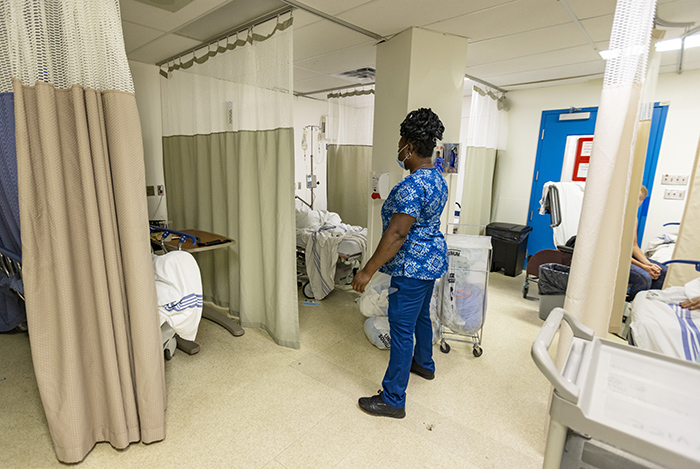2024 Canadian Hillman Prize Winner

Health journalist Aaron Derfel painstakingly documents the likely-preventable deaths of six people in a hospital emergency ward. Although his four-part investigation centres on the Lakeshore General Hospital in suburban Montreal, it exposes a chronic problem in the healthcare system across Canada: understaffed, overcrowded, and under-resourced emergency wards.
In November 2022, a labour mediator called Lakeshore’s ER “a ticking time bomb,” yet no one addressed its systemic problems. Routinely, it operated at more than 150 per cent capacity; there was a chronic shortage of nurses; inadequate training; sporadic oversight; and a lack of functioning equipment. The run-down ER was last upgraded more than three decades ago.

Staff members believe these deaths could have been prevented. The true circumstances were never shared with the patients’ families, and the hospital did not hold meetings to learn from mistakes.
Derfel gained the trust of six clinical sources, he researched extensive records, and he scoured obituary notices and Facebook pages to find and interview family members of some of the deceased. On visits to the emergency ward, Derfel observed the treatment of patients and, just a few hours after his first story was published, he photographed a cubicle wall where a hospital call bell cord had just been removed. He had reported that more than four years earlier, an unsupervised patient had used the cord to hang himself, even though the staff knew he posed a danger to himself.
Through email correspondence, Derfel connects the scandal to the office of Quebec Health Minister Christian Dubé. He also exposes how the local health authority had covered up the circumstances of the deaths of the six patients, depriving their families of information to which they were legally entitled.
His investigation had an immediate impact. After the first installment was published, the government announced an independent investigation into the Lakeshore. That inquiry, made public last June, largely confirmed The Gazette’s findings. In response, the West Island health authority announced the construction of a new $13-million modular ER at the Lakeshore. Two months later, the family of a patient who had committed suicide filed a $310,000 lawsuit against the hospital. The hospital used Derfel’s final report as a guide to improve the functioning of the ER.
This series in The Gazette became a touchstone in Quebec, prompting competing news organizations to report on preventable deaths in the emergency wards of other hospitals. It also was a salve for the families whose loved ones had died. A son whose father committed suicide at the Lakeshore said Derfel was both professional and compassionate, and added, “We learned more from him than we did from the Lakeshore hospital.”
Further reading:
Aaron Derfel is the Montreal Gazette’s medical reporter, specializing in investigative and narrative journalism in a more than 30-year career that has taken him across North America. He is a three-time finalist of the National Newspaper Awards, and in 2021 he won a Canadian Association of Journalists Award for his reporting on the COVID-19 pandemic in Quebec.
Derfel’s 2020 investigation into the horrific living conditions at the Résidence Herron nursing home earned the Grand Prize of the Prix Judith-Jasmin, Quebec’s highest journalism accolade. Quebec Coroner Géhane Kamel publicly thanked Derfel during her inquest into the deaths at the Herron, suggesting that his reporting probably saved lives.
A graduate of the Journalism Program at Concordia University, Derfel has taught at the university since 2001, focusing on access-to-information requests, court records, and financial reporting, among other subjects. His non-fiction narrative of the trauma response to the 2006 Dawson College mass shooting was selected for the book, The Bigger Picture: Elements of Feature Writing. In 2022, Derfel contributed to the book, Traitements-chocs et tartelettes: Bilan critique de la gestion de la COVID-19 au Québec.
Mr. Derfel, 57, lives in Montreal with his wife Anita Wolkoff and their two teenage children.

